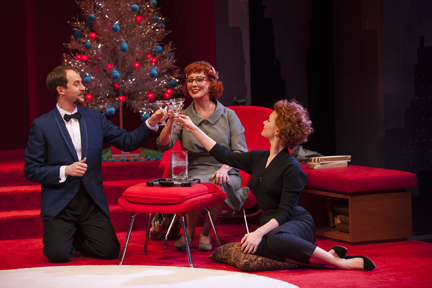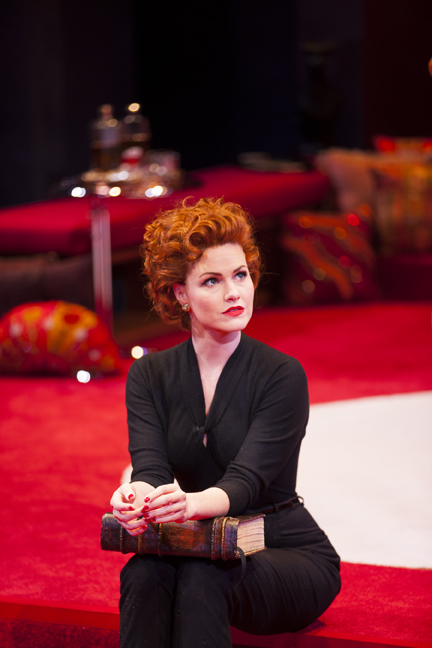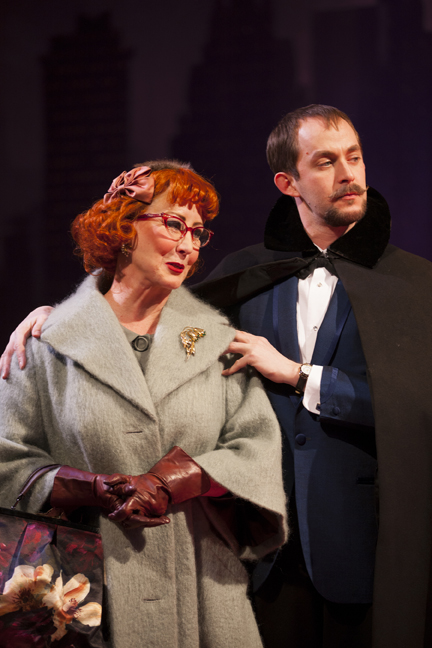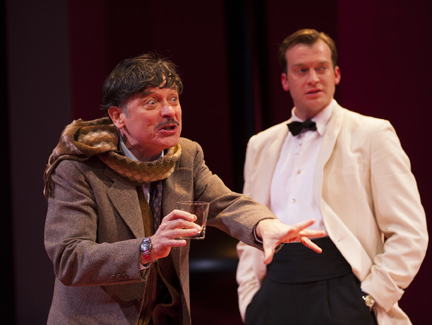John van Druten’s Bell, Book & Candle is a play from a time when subtext was anything not acceptable to polite convention. His characters have class, in a vaguely bohemian milieu (it’s set ostensibly in the 1950s’ Greenwich Village), and they preen and pose with the regulated pauses of the great screen stars of the 1940s. In such a world, the fact that there are things going on that we can’t talk about (we’ve since learned to call them subcultures) would be still somewhat risqué for the average audience. Van Druten, with his comic suggestion that a hunt for witches might turn them up “anywhere,” is a bit ahead of the widespread search for Communists and their sympathizers in the McCarthy “witch hunt,” and way ahead of the political self-outing of the gay community. And yet, in Darko Tresnjak’s production, more respectful than revisionist, those associations are clearly present—to say nothing of any other sub rosa collectivity that might come to mind.

The square to be initiated into it all is Shep Henderson (Robert Eli), a publisher without much imagination who’s all set to marry a Southern harridan we only hear over the phone, until a sort of accidental run-in with his neighbor, the mysterious and grandly available Gilllian Holroyd (Kate MacCluggage), sends him soon enough head-over-heels and all over the floor for her. Tresnjak makes the couple couple much more quickly than they ever would have in films or plays of the period, but not, one assumes, than they would’ve in wicked old Greenwich. It’s to the play’s credit that it seems written for adults—it gives one a nice frisson of nostalgia to watch something that might appeal to people who were all grown up in the 1950s, happily unaware of what the various coming cultural revolutions would do to entertainment. This is romantic comedy before The Pill and Women's Lib.
Case in point: recall the days when a leading man needed only to be a presentable hunk who looks good in a dinner jacket. Eli does, and his Henderson has the doggedness of a man who isn’t expecting much excitement or surprise from life and then finds both in the form of his neighbor, a woman who, supposedly, he’s barely noticed until her witchcraft changes his tune. And of course, “witchcraft,” here is synonymous with whatever “feminine wiles” our parents alluded to when they talked about how a gal gets her man. The fact that Gillian’s wiles are indeed supernatural adds charm rather than menace, but with little of the slapstick spell-casting that was a staple of TV's Bewitched, the Sixties sitcom that recalls some of Van Druten's characters.
Van Druten’s dialogue never sizzles or pops, its sense of the humorous is droll more often than clever, full of charm rather than laugh-filled. It’s the kind of play that won’t work without a game cast willing to become anachronisms with relish, and Tresnjak has coached his cast to get the feel of lines uttered on a sound-stage and etched on celluloid. MacCluggage especially—who was last on the Long Wharf stage as a 40s’ radio actress in Eric Ting’s production of It’s a Wonderful Life—has the look, moves, and voice of a screen star of the era. Always dressed seductively and lit perfectly, she carries herself with feline pleasure in her every move, her voice sensual in its precision, a sympathetic seductress about to be hoist on her own petard: making Shep fall in love with her, she finds that she fulfills “the old wives’ tale” that a witch in love loses her powers, becoming merely human (with a touch of Doris Day).
The play pirouettes on the familiar theme of lovers’ truth: if, in love, we should always be ourselves, why does it always feel so risky to be honest? What’s more, once a gal’s wiles are seen through, then what? Be warned, suspense isn’t really a feature of this plot, but that doesn’t matter. Though two intermissions drag out the playing time, the pleasures of the show come from the exacting pace, Alexander Dodge's wonderfully mod set, from its “womb chair” to its suspended fireplace to its snowflake chandelier, Fabio Toblini's bright and sprightly costumes—particularly Aunt Queenie (Ruth Williamson)’s revamped Andorra (the Agnes Moorehead character in Bewitched) and the jackets and cape sported by Gillian’s teasing brother Nicky (Michael Keyloun, a study in understated camp), and that game cast.
The cast is filled out by Gregor Paslawsky as Sidney Redlitch, a toupee-wearing, booze-swilling “witch expert,” played with the broad panache of a sitcom’s zany neighbor or clueless boss.
Today, vampires and zombies are our chosen avatars of supernatural allegory. Once upon a time, in a Manhattan of sparkling martinis and swirling mambos, of barefoot femmes fatales clad in capri pants, of songs by Sinatra and Ella evincing the spirit of swagger and swing, witchcraft—which has, in New England at least, real historical antecedents—could stand for all those “practices” not yet relegated to the melting pot. Bell, Book, and Candle is a fun throwback to a time not so much innocent as blithely indifferent to the changes to come. And, in Tresnjak’s version, the play ends with a nice touch not in the script, a way of indicating that love without witchcraft is, perhaps, rather Puritan.
Bell, Book & Candle By John Van Druten Directed by Darko Tresnjak
Long Wharf Theatre March 7-April 11
Photos by T. Charles Erickson, courtesy of Long Wharf Theatre




